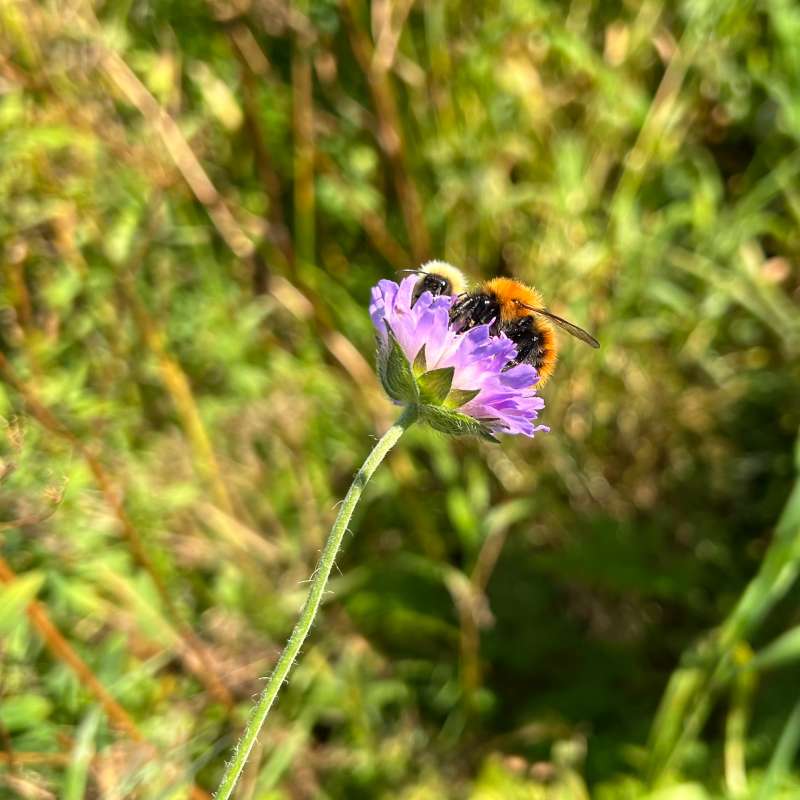Anders Nielsen
Avdelingsleder/forskningssjef
(+47) 913 50 435
anders.nielsen@nibio.no
Sted
Ås - Bygg O43
Besøksadresse
Oluf Thesens vei 43, 1433 Ås (Varelevering: Elizabeth Stephansens vei 21)
Forfattere
Linn Vassvik Anders Nielsen Michael Garratt Bjørn Arild Hatteland Joseph Chipperfield Jørund Johansen Silje Maria Midthjell Høydal Erik Trond AschehougSammendrag
Insect pollinators are important drivers of fruit quality and yield in horticultural systems. The global reduction in wild bee populations has increased the demand for managed honeybees, despite honeybees relatively low pollination efficiency. Here, we assessed how bee communities, bee behaviour, and orchard design in Norwegian apple orchards affects apple pollination success, an important determinant of apple quality. We placed pan and vane traps in 18 apple orchards, in six distinct locations, within the two main apple growing regions in Norway. We also tracked individual bees (honeybees, bumblebees, and solitary bees) throughout the apple flowering season, and recorded their flower handling time, number of flower visits, stigma contact, and movement between apple flowers. Finally, we calculated the seed set rate (ovules developed into seeds / total number of ovules) from 908 harvested apples to estimate pollination success. Our key finding is that pollination success was driven by the abundance of wild bees and overall orchard planting design. We found lower pollination success in block design orchards where a single cultivar is planted continuously over a large area, compared to orchards with an integrated design where compatible cultivars are planted within the orchard. We also found that stigma contact decreased as apple flowering progressed, and that solitary bees visited fewer flowers per foraging event but were potentially more thorough foragers. Our results highlight the importance of promoting wild bees in apple orchards while also ensuring there is compatible pollen in the orchards for optimal pollination.
Forfattere
Lawrence R. Kirkendall Daniel Flø Martin Malmstrøm Anders Nielsen Paul Ragnar Berg Anders Bryn Kjetil Hindar Johanna Järnegren Kyrre Kausrud Erlend Birkeland Nilsen Brett Kevin Sandercock Eva Bonsak Thorstad Gaute VelleSammendrag
VKM has assessed the potential risk to Norwegian biodiversity associated with the import of the Turkestan cockroach, Periplaneta lateralis, as live food for hobby animals. Populations of the cockroach are nearly always found in or near buildings, and non-native populations have never been observed in natural environments. No previous observations of P. lateralis have been reported for Norway and it is very unlikely the species will be able to establish and spread into Norwegian nature due to the low winter temperatures and short summers. Furthermore, VKM find that there is low risk associated with the potential effects on biodiversity, if it against all odds, were to establish in Norway. Therefore, VKM concludes that there is low risk associated with import and keeping of P. lateralis in relation to its potential negative effect on Norwegian biodiversity.
Forfattere
Tuanjit Sritongchuay Michael Beckmann Bo Dalsgaard Alexandra-Maria Klein Angela Lausch Anders Nielsen Julia Osterman Peter Selsam Kanuengnit Wayo Ralf SeppeltSammendrag
There is a global concern about the decline of wild pollinators and the ecosystem services they provide. Although land-use change is a major threat to biodiversity, it is still poorly understood how land-use heterogeneity (or land-use structure) impacts pollinator communities and entomophilous crop production. Based on a literature review, we performed a meta-analysis to (1) assess how landscape structure, both composition and configuration, affects pollinator species richness and abundance, and (2) examine the impact of landscape structure on the production of key entomophilous crops. We extracted information on pollinator communities and crop production from 101 studies with a total of 920 site replicates distributed widely across the globe. To obtain landscape structure (total area of all crops, crop diversity, and landscape Shannon’s Diversity Index) information, we sourced data from the database Map-SPAM as well as satellite images. We found that pollinator species richness increased with the number of crop species in the surrounding area. Pollinator abundance increased with the number of different crops but decreased with increasing agricultural area in the surrounding landscape. Crop production of several crops was associated with landscape heterogeneity. Notably, fruit set increased with an increasing number of crop species in neighbouring fields and decreased with increasing agricultural area, that is, when nature is substituted with agriculture in the surrounding landscape. We also found positive correlations between edge density of an area and pollinator species richness and entomophilous crop production suggesting that edge density can be used as a landscape structure indicator to assess pollinator diversity. The effects of landscape structure were more pronounced in crops with high pollinator dependence, showing stronger relationships with both pollinator diversity and crop production. These findings highlight the importance of maintaining landscape heterogeneity through crop diversity and natural habitats to support pollinators and their services, though unmeasured factors such as intensification or local management may also play a role.

Divisjon for miljø og naturressurser
CANALLS Agroecological practices for sustainable transition
Agroecology covers all activities and actors involved in food systems. It also places the well-being of people (producers and consumers of crops and products) at its core. The EU-funded CANALLS project will focus on the agroecological zones and diverse farming systems in the humid tropics of Central and Eastern Africa. It will explore the complex environmental, social and economic challenges, which in some cases are exacerbated by conflict and high vulnerability. Moreover, it will advance agroecological transitions in these regions through multi-actor transdisciplinary agroecology Living Labs at eight sites in four countries. The focus will be on crops such as cocoa, coffee and cassava, which are vital for subsistence and economic development.

Divisjon for matproduksjon og samfunn
WINGS - Pollinatorvennlige kulturlandskap: Løsninger for forvaltning av leveområder under press
Pollinatorene er truet. Dette får konsekvenser både for det biologiske mangfoldet og matsikkerheten vår. I WINGS skal vi utvikle løsninger for å etablere mer pollinatorvennlige kulturlandskap.
